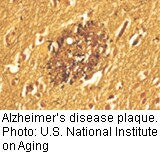
MONDAY, March 12 (HealthDay News) — Scientists have pinpointed how vitamin D3 works with some of the body’s cells to help clear the brain of
amyloid beta, the main component of plaques that are seen in Alzheimer’s disease.
Researchers took blood samples from Alzheimer’s patients and healthy people and then isolated immune cells called macrophages, which consume amyloid beta and other waste products in the brain and the body.
They found that vitamin D3 may activate certain genes and cellular signaling networks to trigger the immune system to clear amyloid beta, according to the study published in the March 6 issue of the Journal of Alzheimer’s Disease.
Previous research by the same University of California, Los Angeles, team found that therapy with vitamin D3 and curcumin — a chemical found in the spice turmeric — seemed to boost the ability of macrophages to clear amyloid beta from the brains of Alzheimer’s patients. However, it wasn’t known how this might work.
“This new study helped clarify the key mechanisms involved, which will help us better understand the usefulness of vitamin D3 and curcumin as possible therapies for Alzheimer’s disease,” study author Dr. Milan Fiala, a researcher at the David Geffen School of Medicine at UCLA and the Veterans Affairs Greater Los Angeles Healthcare System, said in a UCLA news release.
More information
The U.S. National Institute of Neurological Disorders and Stroke has more about Alzheimer’s disease.

